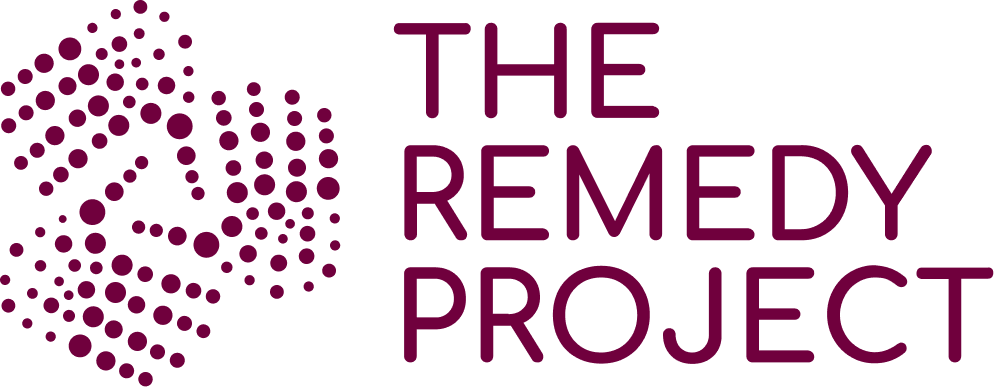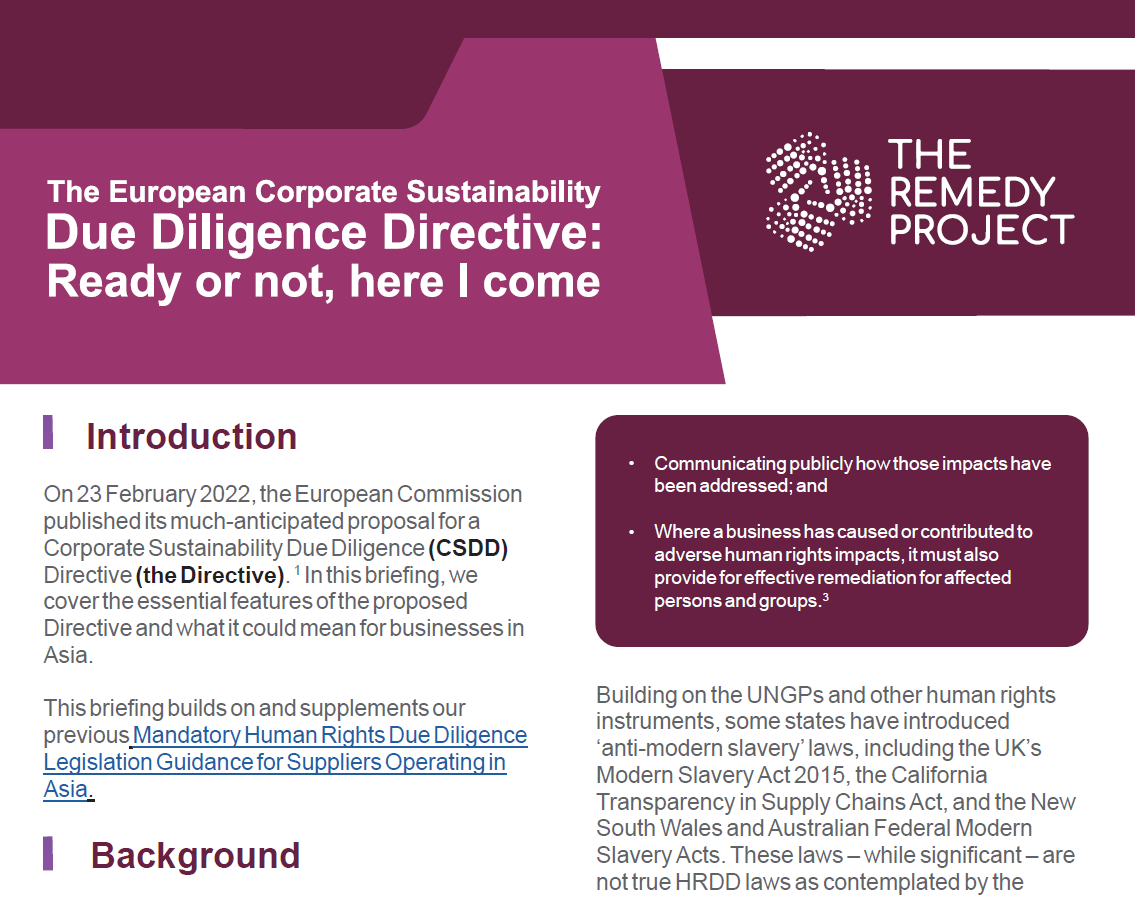
Publications
Policy Paper on Human Right Due Diligence by Companies in the Seafood and Palm Oil Sectors in Asia
-
This briefing is designed to provide an overview of the extent to which companies in Asia, focusing on the palm oil and seafood sectors, have incorporated HRDD into their operations.
It outlines the drivers for HRDD adoption by companies in Asia, the opportunities and risks, the business case for incorporating HRDD, and sets out how companies can engage with affected stakeholders and their credible representatives to conduct meaningful HRDD, in line with the UN Guiding Principles on Business and Human Rights (UNGPs).
Enforcing Human Rights Regulation - Borrowing From the FCPA Enforcement Playbook
-
In this article, The Remedy Project examines the parallels between the U.S. Foreign Corrupt Practices Act and emerging human rights legislation to explore how companies can draw on anti-bribery practices to develop systemic-level improvements in business respect for human rights.
Feedback on Japan’s Draft Guidelines on Respect for Human Rights in Responsible Supply Chains
-
In August 2022, the Japanese Ministry of Economy, Trade, and Industry published draft guidelines for businesses on Respect for Human Rights in Responsible Supply Chains.
This submission sets out our feedback on the draft Guidelines.
Using Third Parties to Support the Design and Implementation of Grievance Mechanisms
-
These guidelines, developed by The Remedy Project in partnership with Bonsucro and the Responsible Jewellery Council, have been developed to support voluntary sustainability standard setting organizations (VSS organizations), businesses, or industry groups that operate, or are seeking to partner with local third-party organizations to develop company or multistakeholder grievance mechanisms in accordance
with the principles set out in the United Nations Guiding Principles on Business and Human Rights (UNGP).These guidelines describe how third-party partners can support these organizations in the design and implementation of grievance mechanisms, and provide a practical framework for selecting a suitable third-party partner.
Human Rights Due Diligence and Remediation Mechanisms: Two Sides of the Same Coin - Guidance for Japanese Companies
This briefing is also available in Japanese
-
In this briefing paper, The Remedy Project illustrates how an effective remediation mechanism can help support Japanese companies fulfil their human rights due diligence responsibilities and enhance responsible business practices.
Protecting Migrant Workers in Indo-Pacific Supply Chains: A Good Practice Guide for Businesses and Bali Process Member States
-
This guide, developed by The Remedy Project on behalf of the IOM, presents a range of good practices and scalable solutions for businesses and the Bali Process Member States to protect migrant workers from labour exploitation, in line with the Bali Process Declaration, especially Government and Business Forum (GABF) commitments expressed in the Acknowledge, Act, Advance (AAA) recommendations, and the Global Compact for Migration.
This publication was made possible through support and funding provided by the Regional Support Office of the Bali Process on People Smuggling, Trafficking in Person and Related Transnational Crime (Bali Process) and the Government of Australia as part the IOM’s Migration, Business and Human Rights (MBHR) Asia Initiative.
Beyond Business as Usual: Asian Civil Society Response to the European Commission’s Proposed Corporate Sustainability Due Diligence Directive
-
This open letter sets out the collective response of ten civil society groups and non-government organisations to the European Commission’s proposed Directive on Corporate Sustainability Due Diligence (the Directive), announced on 23 February 2022. It provides detailed recommendations to the Commission on improvements to the proposed Directive from the perspective of civil society groups in Asia.
Mandatory Human Rights Due Diligence: Guidance for Suppliers Operating in Asia
-
Recently, companies, consumers and governments have turned their attention to environmental, social and governance (“ESG”) matters.Calls for accountability and consistency have led governments to increasingly consider, and in many cases pass, laws requiring companies operating within their jurisdiction to make disclosures according to specific rules. In particular, there has been an uptick in mandatory human rights due diligence (“mHRDD”) legislation. Even if a company is not subject to a particular mHRDD law, such legislation is likely to impact the company due to the cross-jurisdictional nature of supply chains. Therefore, to stay competitive and relevant to buyer markets, companies acting as suppliers and business partners should be aware of mHRDD laws and the expectations therein.This article provides an overview of certain mHRDD laws, their purpose, and recommendations for subject companies and those in their supply chains to stay in compliance and maintain business.
Legal Training Program for Anti-Human Trafficking Practitioners in Thailand (video)
-
Produced by The Remedy Project in partnership with Winrock International and USAID Asia Counter-Trafficking in Persons, this is a series of three Thai language online training videos for anti-human trafficking legal practitioners in Thailand.Each video covers a different aspect of the law and practice of working on trafficking in persons cases.Module 1 covers the anti-human trafficking legal framework under international law and general principles derived from international law on working with victims of trafficking.Module 2 covers the Thai domestic legal framework for the identification, protection, and support for victims of trafficking - and access to remedies.Module 3 covers working on cross-border and strategic litigation in trafficking in persons cases, including forming and using case typologies.The videos can be accessed through the Freedom Collaborative Thailand Resource Toolkit, by searching for “Anti-Human Trafficking Legal Training” under ‘all resources’.
The EU Corporate Sustainability Due Diligence Directive: Guidance for Businesses in Asia
-
On 23 February 2022, the European Commission published its proposal for a EU Corporate Sustainability Due Diligence Directive.In this briefing, we outline the key features of the Directive, what it would mean for businesses in Asia, and what Asian businesses can do to prepare for the era of corporate sustainability due diligence.
Operational Guidelines for Businesses on Remediation of Migrant-worker
Grievances
-
Developed by The Remedy Project in partnership with IOM CREST, the Operational Guidelines for Businesses on Remediation of Human Rights Grievances, authored for the IOM aim to help companies and industry groups to develop voluntary programmes to remediate worker grievances - with a particular focus on addressing human rights concerns of migrant workers in international supply chains. The recommendations provided by these Guidelines are grounded in industry and international best practices for compliance and advancement of human rights, including the United Nations Guiding Principles on Business and Human Rights.
Submission to the Hong Kong Stock Exchange
-
This submission sets out The Remedy Project’s response to the Hong Kong Stock Exchange’s review of the Corporate Governance Code and Listing Rules relating to sustainability and directors’ duties.
An Apparel Supplier’s Guide: Key Sustainability Legislation in the EU, US, and UK
-
This document is intended to enable suppliers in the apparel value chain - and others who are seeking to better understand upcoming legislation - that are established or headquartered outside of the Global North, or whose operations are based outside these jurisdictions, to better understand how sustainability-related legislation in the Global North will impact them.
From Local to Global: Building a strategic litigation ecosystem to address modern slavery in supply chains
-
This is the public summary of a multi-jurisdictional research study, conducted for the Freedom Fund by The Remedy Project, that explores pathways to pursue strategic litigation to address modern slavery in supply chains in South East Asia. This study examines the existing legal and practical ecosystem to support corporate accountability-focused strategic litigation efforts in Thailand, Malaysia, and the Philippines, and how these might affect transnational litigation.
Response to Consultation on First Malaysian National Action Plan on
Forced Labour
-
This submission sets out The Remedy Project’s response to the public consultation on Malaysia’s first draft National Action Plan on Forced Labour. This submission sets out our thematic and policy recommendations on the overall draft National Action Plan as well as detailed recommendations on specific activities proposed under the draft National Action Plan.
Putting things right: Remediation of forced labour under the Tariff Act 1930
Recommendations for the European Commission
Summary of Key Findings and Recommendations
Summary also available in Chinese, Hindi, Malay, Nepali, Portuguese, and Thai
-
The report examines 9 case studies from 7 jurisdictions and 8 industries, including distant water fishing, manufacturing, and agriculture, where actual or threatened import bans under the Tariff Act have been imposed, in order to identify the remediation measures companies have undertaken in response, and to what extent those responses led to the provision of remedies to workers and other affected rights holders.
Drawing on findings from the case studies, the report sets out recommendations for different stakeholders including workers, trade unions, civil society, the CBP, governments, the European Union, and the private sector, on how import bans can be used as a more effective tool to support the provision of remedies to workers and other rightsholders in conditions of forced labour.
















